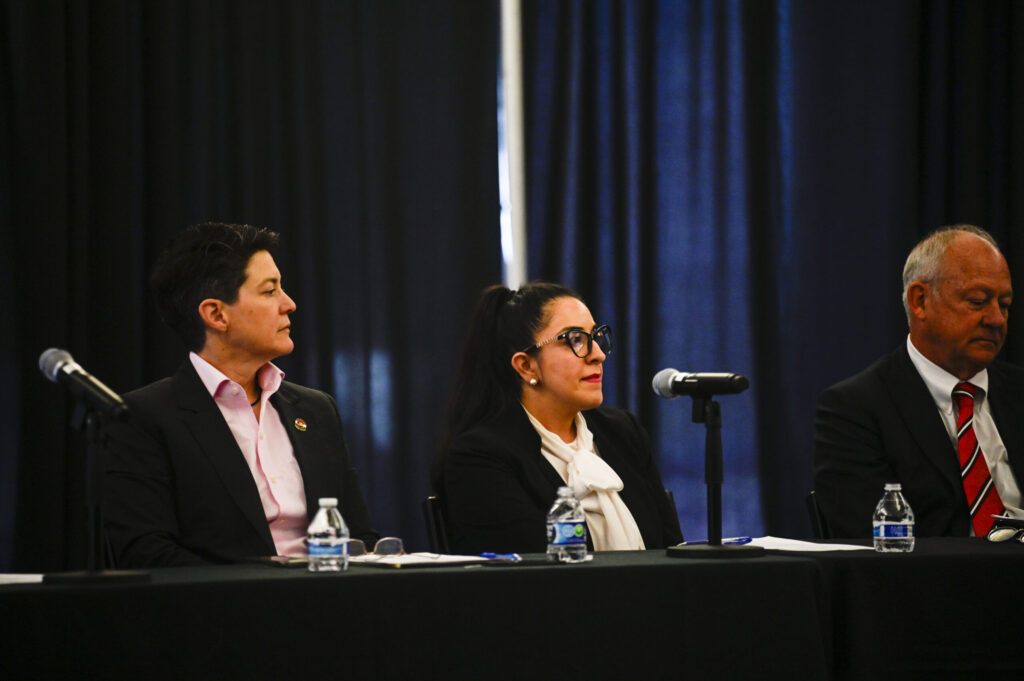Appeals court rules Colorado free speech law applies in eviction cases, urges legislature to reconsider
Colorado’s second-highest court ruled for the first time last week that a 2019 law intended to protect First Amendment activity from litigation does apply to eviction proceedings and to claims across the board, not simply to defamation lawsuits.
However, in an unusual move, a three-judge panel for the Court of Appeals explicitly called on lawmakers to change the law and prevent procedural chaos from unfolding in a specific scenario: appeals from county courts, where the majority of evictions are filed.
Judge Christina F. Gomez, writing in the May 30 opinion, expressed her frustration that in the case of tenant Scott D’Angelo, the county court, district court and appeals court were all taking action on various portions of the litigation because lawmakers had not clearly outlined what should happen when an appeal on First Amendment grounds is filed in an eviction proceeding.
“All three courts have wasted resources by considering issues that may not have needed to be resolved or were being addressed by another court,” she wrote. “And there has been significant confusion as to what court had jurisdiction over what issues and how the proceedings in one court affected those in the others. Yet this is apparently what the General Assembly has authorized.”
Colorado lawmakers enacted the “anti-SLAPP” law, which stands for “strategic lawsuits against public participation,” to provide a mechanism for quickly disposing of litigation that implicates a person’s First Amendment rights — specifically, the rights to free speech and to petition the government.
Although the Court of Appeals has repeatedly interpreted the anti-SLAPP law in defamation lawsuits — in contexts that include consumer reviews, school sexual misconduct investigations and the publication of election-rigging allegations — D’Angelo’s case marked the court’s first time considering whether an eviction proceeding could also fall under the anti-SLAPP law’s shield.
D’Angelo resided at Sunset Park apartments in downtown Denver, operated by Volunteers of America. The landlord moved to terminate D’Angelo’s lease in early 2023, alleging he continued to post “false, derogatory, and potentially libelous statements and videos on Facebook.” Specifically, D’Angelo aired his views about the living conditions and safety of his apartment complex, which the landlord deemed unsubstantiated.
Hours before the scheduled trial, D’Angelo filed a motion to dismiss the case under the anti-SLAPP law, arguing Sunset Park was evicting him “solely” for his protected speech on matters of public interest.

The Ralph L. Carr Colorado Judicial Center in downtown Denver houses the Colorado Supreme Court and Court of Appeals.
County Court Judge Reneé Goble responded that, in her reading of the law, “this is not an action involving the exercise of constitutional rights. This is an action for a breach of contract. That is what (an eviction) is.”
She concluded the anti-SLAPP law did not apply and ordered the trial to begin immediately, refusing to pause the proceedings and allow an appeal to go forward. Goble ultimately sided with Sunset Park, finding D’Angelo’s disruptive behaviors violated his lease — unrelated to his online speech.
From there, D’Angelo’s case spawned an unusual web of appeals. D’Angelo challenged Goble’s final ruling in Denver District Court, which is the standard path for county court cases. Meanwhile, he appealed her denial of the anti-SLAPP motion to the Court of Appeals, which is the pathway under the anti-SLAPP law. Both sets of appeals proceeded simultaneously, with a district judge ordering a new eviction trial while the Court of Appeals was analyzing the anti-SLAPP arguments.

The State Capitol on Wednesday, Jan. 24, 2024, in Denver. (AP Photo/David Zalubowski)
Gomez noted that procedurally, such a scenario should not happen. However, the legislature had not prevented it from occurring when it enacted the anti-SLAPP law.
Consequently, “we urge the General Assembly to consider amending the anti-SLAPP statute to more specifically address its application to county court and (eviction) proceedings and to avoid situations like this one where two different courts exercise appellate jurisdiction over the same proceeding at the same time,” she wrote.
The appellate panel concluded Goble’s interpretation of the anti-SLAPP law’s reach was incorrect. Not only does it apply to cases in county courts, but to any litigation involving speech- or petitioning-related activity.
“Whether an action falls within the scope of the anti-SLAPP statute doesn’t depend on what type of claim is pleaded; rather, it depends on the conduct underlying the claim,” Gomez wrote. “Again, the policy choice on whether the statute should apply in such proceedings is one for the General Assembly — not us.”
Because Goble did not evaluate whether Sunset Park’s allegations against D’Angelo stemmed from First Amendment activity, the panel ordered her to reconsider the original motion to dismiss the case.
Attorneys for Sunset Park and D’Angelo did not immediately respond to a request for comment. The lawmakers who sponsored the 2019 anti-SLAPP law similarly had no immediate response to Gomez’s call for revisions.
The case is VOA Sunset Housing LP v. D’Angelo.











